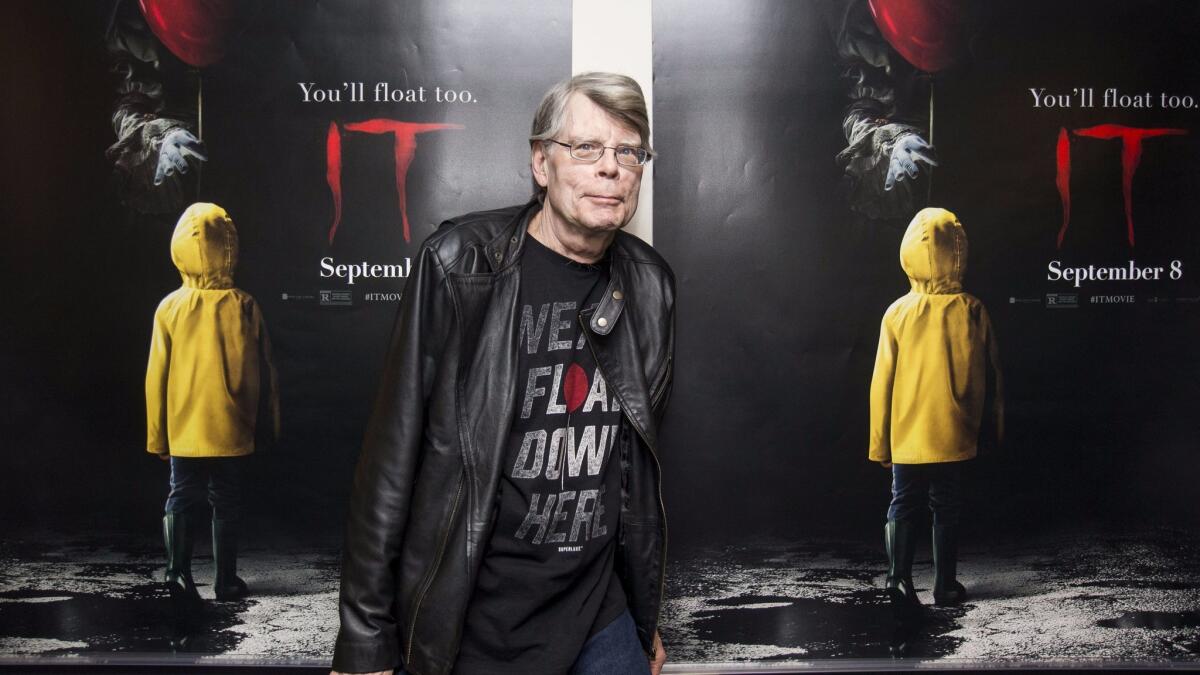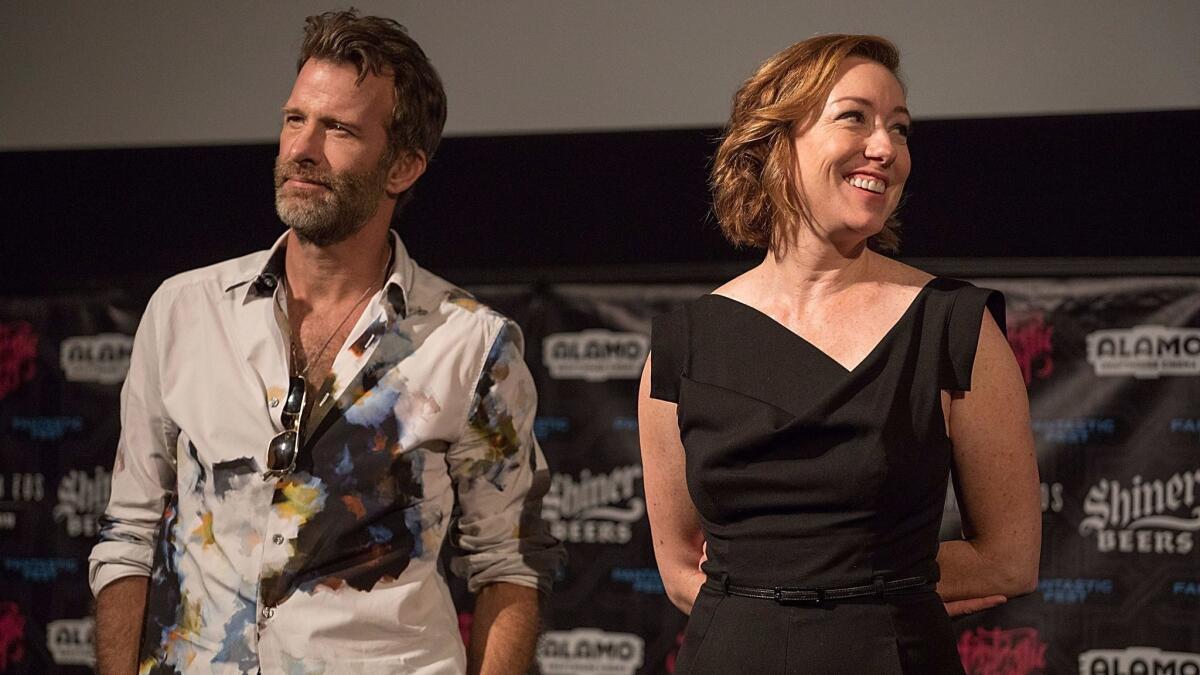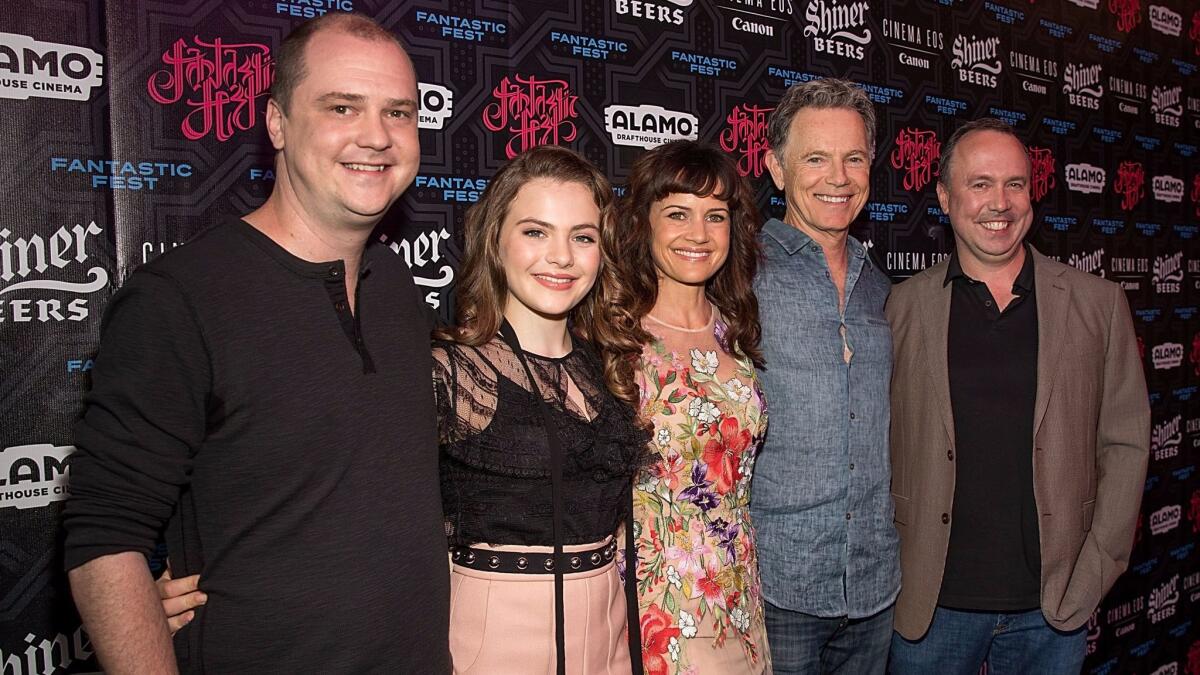We’re in the throes of Stephen King mania, again. Here’s why his scary stories resonate

Reporting from Austin, Texas — Pop culture is in the midst of a full-on Stephen King boom. Again.
On the heels of the historic box office success of Warner Bros.’ $478 million-grossing “It” remake — now the biggest R-rated horror movie in history — come a cluster of King adaptations led by Netflix’s “Gerald’s Game” and “1922,” Audience network’s “Mr. Mercedes” and Hulu’s upcoming “Castle Rock.”
One could argue that Hollywood has never not been in the throes of one long and sustained King obsession. His 54 novels and nearly 200 short stories have been adapted into more than 60 feature films and dozens of television projects, since “Carrie” first christened the Stephen King Cinematic Universe in 1976 in a glorious shower of pig’s blood.
Our current moment of King mania is fed by multiple generations of filmmakers weaned on the horror author’s yarns. “Gerald’s Game” director Mike Flanagan was hooked the moment he read his first King book, the evil clown terror tale “It,” as a boy. By the time he graduated to reading the racy 1992 bestseller “Gerald’s Game” in college, the future filmmaker was a fully fledged King devotee — and the story, about a woman handcuffed to a bed trapped in her own unraveling mind, took root in his imagination.
“I’ve had this movie in my head for half my life,” said Flanagan, the director of horror and suspense films “Oculus,” “Hush,” and “Ouija: Origin of Evil.”

Bill Skarsgård plays a monster that takes the shape of a clown called Pennywise in the movie remake of “It,” based on the Stephen King novel.
His imagination is seemingly limitless, and that always will have traction for popular entertainment.
— Leonard Maltin on Stephen King
“Gerald’s Game,” whose protagonist spends most of the story wrestling with her interior demons and past traumas, always seemed to be one of King’s most unfilmable stories.
But Flanagan found a way in, conceiving a visually inventive take on the single-location psychological thriller. With King’s blessing he and co-writer Jeff Howard adapted “Gerald’s Game” into a feature script and found a company willing to take on the challenging project in Netflix, which begins streaming the film Friday. Anchored by a powerhouse turn by star Carla Gugino, the film premiered to strong reviews at Fantastic Fest in Austin, Texas, this week.
“It was one of the most harrowing and emotionally visceral stories I’ve ever read,” Flanagan told The Times at Fantastic Fest. “I would go around taking general meetings trying to be a writer carrying a copy of the book with me so when they asked, ‘What’s your dream project?’ I’d say, ‘This.’ ”
What is it about King’s stories that makes for particularly potent screen projects?
“He comes up with concepts and premises that touch a nerve, whether it be a creepy clown, or a deserted hotel in an isolated snowy location, or a berserk fan who exacts revenge on her once-favorite author,” film critic Leonard Maltin remarked at Fantastic Fest, which also premiered “1922,” a period thriller for Netflix adapted from a short story published in King’s 2010 collection “Full Dark, No Stars.”
“His imagination is seemingly limitless, and that always will have traction for popular entertainment,” added Maltin, pointing out that in Hollywood, where preexisting intellectual property holds boardroom value to executives with green-light power, King’s name alone can lend a crucial commercial and creative boost. “Even after decades he remains a potent brand name. There aren’t many authors — let alone genre authors — who can make that claim.”
“No rock is being left unturned,” said David Katzenberg of KatzSmith Productions, one of the producers of the new “It” movie, whose sequel has already been dated for 2019 following the film’s blistering box office success. “With Netflix and premium cable and on demand right now, everyone just wants IP [intellectual property]. We went and looked through the book of Stephen King [titles] that was available, and everything is taken. Someone has the rights to almost all of it.”
It helps that King’s public position on other people adapting his stories is far from precious. And his supportive Tweets bolstering films like “It,” “Gerald’s Game” and “1922” lend these recent adaptations the most important stamp of approval to both fans of his material and the filmmakers themselves.
Zak Hilditch grinned proudly as he recounted the day that King, vetting his pitch to adapt “1922” into a feature film, viewed his 2013 apocalyptic thriller “These Final Hours” — a huge moment for the Australian writer-director, who wore out his home VHS copy of the iconic 1990 “It” miniseries as an 11-year-old King fan. “Talk about surreal,” Hilditch smiled.

With King’s go-ahead, he wrote and directed “1922,” a morality tale based on the author’s short story about Nebraska farmer Wilfred James (played by a remarkably lived-in Thomas Jane) who conspires to murder his wife, only to be plagued by her ghost as karmic consequences of his crime begin to dissolve the life he so desperately sought to hold on to in the first place.
“You want to do the characters he created justice; you want to do as good a job as he did on the page. I didn’t want to let him down, and the fact that he digs it is sort of all that really matters,” he said. “The novella was one of the best things I’ve ever read — so evocative, so tragic. It has a way to make you empathize with characters that you wouldn’t necessarily ever empathize with.”
Although the core trajectory of “1922” hews true to the source material, Hilditch made deviations and adjustments in his adaptation, leaving out certain supporting characters to retain a tight focus on his core cast. In particular, the way he writes the character of Wilfred’s wife, Arlette (Molly Parker), clarifies the pointed gender commentary bubbling beneath the surface — and makes “1922,” like the cathartic survivor saga “Gerald’s Game,” feel presciently attuned to the present.
“To me, the whole story is about one man’s terrible decision and the repercussions that he does not think through,” said Hilditch, whose “1922” is a tragedy in which Arlette’s strong modern femininity falls victim to Wilfred’s threatened traditionalist, entitled — and violent — masculinity.
“I didn’t want to play her like she ought to be murdered,” Parker quipped at the film’s premiere.

It’s no coincidence that the contained character-focused storytelling of these two King adaptations has been more successful of late than the universe-building ambitions of, say, Columbia Pictures’ “The Dark Tower,” a high-profile, commercial disappointment which borrowed elements from eight books’ worth of sky-high concept story for one 95-minute film.
“King loves his complicated mythologies, invented languages and crossovers between works. And I love those things in his books,” Tasha Robinson, film and TV editor of the Verge, commented from Austin, where she reviewed “1922” and “Gerald’s Game.” “But the King stories that work best onscreen are the ones without these things, the ones that tell relatable human stories that either don’t touch on the supernatural or have just enough of it to bring in an unpredictable, exciting edge.”
Given the enormous span of small- to large-scale stories in King’s bibliography, from his high-fantasy concepts to the sinister dread of his most terrifyingly mundane scenarios, there’s no one magic formula to adapting the King of Horror, whose best screen adaptations run the gamut from “The Shining” to “The Shawshank Redemption.” But the current zeitgeist of character-focused King films that do work suggest a certain approach resonates when done right.

“I love Stephen King, I’ve read nearly everything he’s published, but I’m here to say, closer fidelity to the text wasn’t going to save ‘Dreamcatcher,’ or make ‘Maximum Overdrive’ a good movie,” Robinson said. “But new additions aren’t an easy answer, either. It really depends: Are those additions meaningful and memorable?”
A “Dark Tower” TV series is still in the works from “The Walking Dead’s” Glen Mazzara; James Franco is attached to a film version of “Drunken Fireworks”; and more King properties in various stages of development include a movie based on “The Long Walk” and remakes of “Firestarter,” “Pet Sematary” and “The Stand.”
Flanagan, who will reunite “Gerald’s Game” stars Gugino, Kate Siegel and Henry Thomas in his Netflix series adaptation of Shirley Jackson’s “The Haunting of Hill House,” has his eye on more King, including “Doctor Sleep,” which is a sequel to “The Shining,” and “Lisey’s Story,” the 2006 novel inspired by King’s marriage following his 1999 car accident.
“There’s an amount of coincidence in the timing of this massive [King] explosion this year,” Flanagan admitted. “In the past there was a sense you had to make massive changes, that his adaptations don’t always translate very well. What I love is that especially after ‘It,’ it’s going to be easier to sell someone on a faithful King adaptation.”
Times staffer Meredith Woerner contributed to this report.
MORE ON STEPHEN KING
Review: ‘It’ delivers nightmarish visuals but misses the true horror of Stephen King’s classic
Review: Stephen King’s ‘Mr. Mercedes’ hits TV in the slow lane, but that’s not a bad thing
With ‘It,’ Hollywood looks for hope in a classic of fear
Horror blockbuster ‘It’ completely crushed box-office expectations. What happened?
‘It’s’ new Pennywise actor Bill Skarsgard breaks down what makes the clown so scary
Review: The joyless adaptation of Stephen King’s ‘The Dark Tower’ was hardly worth the wait
Review: Stephen King’s ‘Bazaar of Bad Dreams’ pulls us in and then out
Review: Creepy thriller ‘Dig Two Graves’ evokes the best of Stephen King
A Star Is Born: Stephen King turns 70











